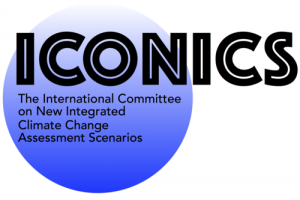
ICONICS invites you to its next webinar on Tuesday, October 25 from 15:00-16:30 CEST.
As part of the ICONICS webinar series, our next topic is on communicating climate futures. The aim of this webinar is to give scientists around the world working on scenarios research (the ICONICS community), insight into how the public understands climate scenarios, and how professionals are communicating about them. For the speakers, we hope it might also be interesting to connect with these scientists and hear their questions and concerns. For all, we hope the discussion will spark questions and inspiration.
 © University of Washington | https://depts.washington.edu/iconics/
© University of Washington | https://depts.washington.edu/iconics/
The International Committee On New Integrated Climate change assessment Scenarios (ICONICS) develops, facilitates, and promotes the use of socioeconomic development pathways to support interdisciplinary research and assessment of climate change-related risks, and to support exploration of the effectiveness of adaptation and mitigation policies and actions across spatial and temporal scales to reduce those risks within the context of the Sustainable Development Goals.
Agenda
Welcome and Introduction - ICONICS host(s), Keywan Riahi/Brian O'Neill, and Katherine Leitzell, IPCC Working Group I TSU Comms Manager (10 mins)
Part I: What do we know about public communication of climate scenarios? (30 min)
- Communicating climate scenarios in the IPCC: Experiences and Challenges
(Sigourney Luz, IPCC WGIII and Arlene Birt, IPCC SYR) - Climate scenarios in the media coverage of IPCC Sixth Assessment Report
(James Painter, Environmental Change Institute, Oxford, UK) - Q&A
Part II: Inspiration from communicators (30 min)
- Shreya Jai - Climate and Energy Journalist, Business Standard India
- Andrew Dana Hudson, Novelist and Futurist (author of Our Shared Storm, a novel set in five different futures framed by the SSPs)
- Kirsikka Vaajakallio, Design Principal, Hellon, Creator of the Sustainable Futures Game
- Questions for all panelists, and discussion (20 min)
Upcoming Events
Potsdam Institute for Climate Impact Research (PIK) & Online
German IIASA Networking Event: "Systems analysis for a sustainable and peaceful future"
Online and Austrian Academy of Sciences (Doktor-Ignaz-Seipel-Platz 2, Vienna)